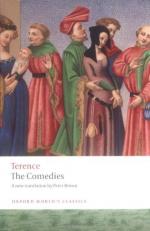|
This section contains 5,647 words (approx. 19 pages at 300 words per page) |

|
SOURCE: "Conclusion" in The Art of Terence, Basil Blackwell, 1923, pp. 131-52.
Norwood was an American classical scholar whose books include Greek Comedy (1932) and Pindar (1945). In the following excerpt from his well-regarded monograph on Terence, he summarizes Terence's career, praising especially the playwright's humanist impulse and declaring him "the most Christian writer of pagan antiquity."
[Terence] is an attractive, a tantalizing, almost a mysterious figure. A native of Africa, not a Carthaginian but of Libyan birth, and possibly a mulatto or a quadroon (as Suetonius' description, mediocri statura, gracili corpore, colore fusco, might suggest), he was brought in childhood to Rome and became the slave of one Terentius Lucanus, a senator. This excellent man, little dreaming that by his good nature he was conferring a notable benefit upon posterity, gave the lad a sound education, and ultimately his freedom and his own name. Terence enjoyed the intimacy of Scipio...
|
This section contains 5,647 words (approx. 19 pages at 300 words per page) |

|


